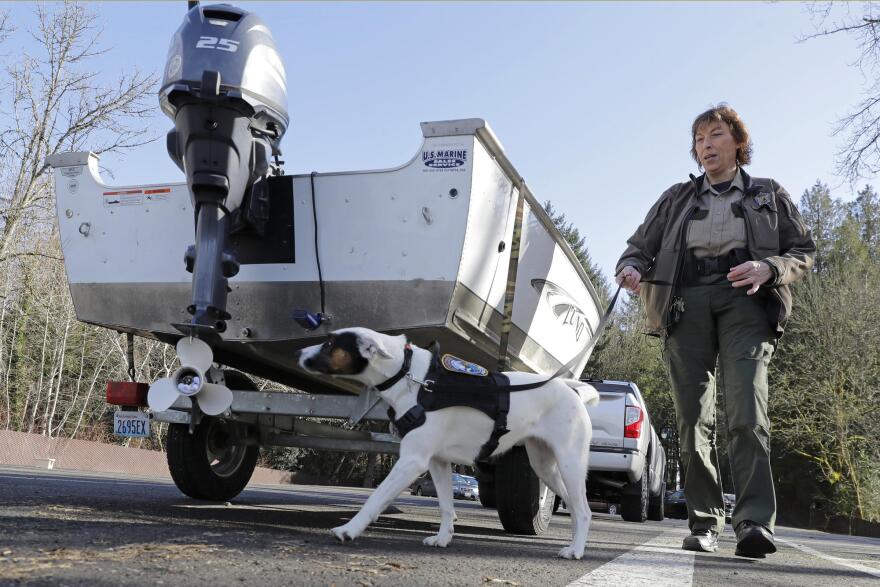At a public boat launch on Black Lake, south of Olympia, Sgt. Pam Taylor holds dozens of small, dark black shells in the palm of her hand. At her side is an inquisitive white hound, barking enthusiastically.
“These are what I put in the little socks to train Puddles,” says Taylor, an inspector with the Aquatic Invasive Species program at the state Department of Fish and Wildlife.
It's Invasive Species Awareness Week in Washington. Public officials, like Taylor, are warning that non-native invaders can proliferate quickly and wipe out native ecosystems. And they’re calling on the public to help find them and prevent their spread.
Puddles is arguably the cutest foot soldier in that public relations push. She’s the newest tool in a decades-long fight against a particularly egregious offender: freshwater mussels that often hitch a ride on boats entering the state from other parts of the U.S.

Puddles is a rescue dog from a shelter in California, who has been trained to help find zebra and quagga mussels.
Taylor smiles at the dog, holding back the shells.
“They’re mussels, aren’t they bud?” she says gently to Puddles, who answers with a chorus of increasingly insistent barks.
An affectionate short-haired mutt with a distinctive patch of black and brown over the left side of her face, Puddles is thought to be Jack Russell terrier mix. She got this job because of her personality, which had kept her from finding a forever home. Typically dogs like her get returned to shelters more than once.

“She was probably a rambunctious dog that tore things apart, wherever she went,“ says Taylor, with Puddles whining in the background, asking for a reward.
“They’re high strung. They’re obsessed. Initial testing is an obsession with a ball or a toy. Because they need to want to work for that,” Taylor says.
Puddles' training has transformed her into a wildlife agent. She's obsessed with a rope toy and the tug-of-war game that she only gets to play if she finds the invasive mussels. Taylor again shows us the shells in her hand.
“These are mussels that I actually pulled off a boat — these are quagga mussels,” she says. “And these are adults. So you see how small they are at adult size?”
They're smaller than a thimble. But Taylor says they spread like expanding foam once they start reproducing. The state is doing all it can to keep these invasive mussels out. If they take hold on a boat or bridge or culvert, they quickly coat and clog motors and pipes needed for things such as irrigation and hydroelectric power, ruining infrastructure that can cost millions to repair.
Capt. Eric Anderson, Taylor’s supervisor, says the extent of the possible damage would affect everyone in the state, driving up power bills, grocery prices — you name it. If the mussels got into the dams on the Columbia River system, for example, he expects they would cover fish passages meant to protect endangered salmon.
“They’ll turn them into killing machines. Instead of having smooth bypass pipes where the smolts are heading out to sea, they’re going to be Cuisinarts — covered with shells that are sharp, that will beat the little fish — and have a higher mortality than there already is,” Anderson ays.
These types of mussels were first discovered in the U.S. in the 1980s. They’re thought to have come on ships from the Mediterranean. Washington, Oregon and Idaho are the only states that have not yet tested positive for them. Fish and Wildlife has been working on prevention for more than a decade, with an action plan drafted in 2009.
Puddles’ advantage is that she can detect the mussels’ larvae with her nose, before they're even visible. Her sense of smell is said to be about 40 times keener than ours. And she's faster than human inspectors.
It's illegal to transport or spread invasive species and violators can face jail time and steep fines if they intentionally skip inspections. But so far, Puddles hasn't nabbed anyone.
“Fortunately, she has not found anything coming into the state. Because there’s only one of her and two check stations and 32,000 boats,” Taylor says. "So, if she found them, we’d have a problem.”
But, it’s early days yet. Puddles started her job at Fish and Wildlife in May. Taylor and others on the inspection crew say they’d love to expand the canine team.
So far, they say Puddles has more than earned her keep and cost the state almost nothing; her work is supported by a grant from the federal Bureau of Reclamation. She's celebrated on social media and booked solid with educational events for the public.
"She's the queen of outreach," Anderson says. "Everyone loves a dog."








